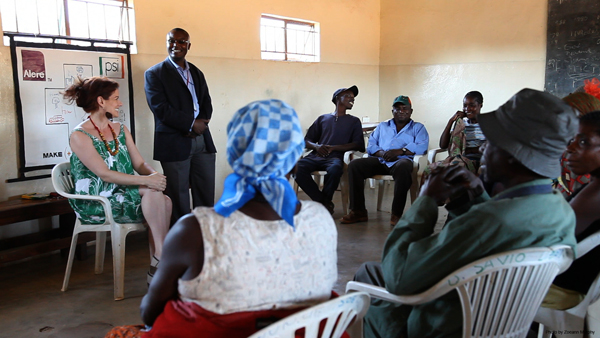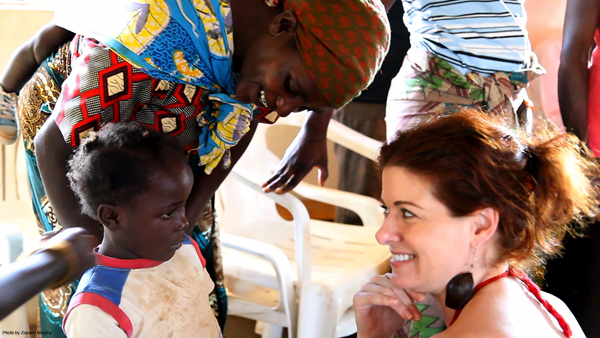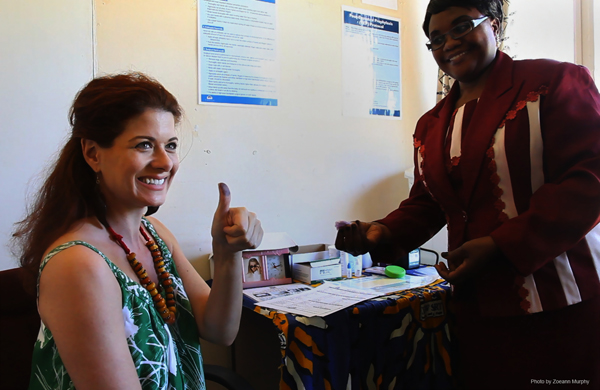
In May, Debra Messing went to Zambia on a trip with PSI and Alere, the largest manufacturer of HIV testing technology. While there, she met with families, communities, health ministers, and doctors to learn about what HIV interventions are producing results on the ground -- and what gaps need to be filled. This week, Debra is in Washington, D.C. to participate in the 2012 International AIDS Conference. Below is the third in a series of three personal journal entries that she wrote while in Zambia. Read Part 1 here and Part 2 here.
Wednesday, May 23: Counseling and testing center in Kanyama
I went through the counseling and testing process this week because I figured I needed to walk the walk if I was going to tell others, particularly couples, how important and easy it is to get tested. I think getting tested is one of the most sincere acts of love a couple can show for one another.
The testing center was at the local YWCA in Lusaka. I decided to get tested with Marshall, my friend and colleague from PSI, to send a message about the importance of couples getting tested. The clinic was clean, bright, and friendly. The counselor who tested us was incredibly thorough and professional and really helped me relax. We had our results in 20 minutes -- so quick! I was surprised by how easy and painless the whole process was -- and it was completely confidential. And for couples, it provides an open and honest environment to talk about risk, to disclose your status, and to chart your path together.
If either one of us had tested positive, the counselor would have walked us through exactly what we needed to know to stay healthy and live positively. It really was a fantastic experience. But as uplifting as the experience was, I kept thinking about Connie and the children she lost, and about Irene and how sick she became before she knew her status and could access medication. We need more people to get tested.
By the time I met with Connie's HIV support group on late Wednesday, I had a fuller understanding of just how difficult living positively can be. But this particular group was not looking for pity. Many of them had been through hell and back -- literally.
The road to Kanyama, the town where the support group met, took us through some of the worst slums I've ever seen. There were piles of trash burning on the side of the road, and chickens, pigs, and goats roaming freely in the streets, picking at the garbage strewn on the ground.
As we pulled up to the clinic, I immediately noted the contrast to the YWCA clinic where I'd been tested: This one was much humbler and, given the condition of the buildings, a reflection of the poverty surrounding the clinic. I walked into a small room next to a sunny courtyard and met Connie. She greeted me with a hug and a big smile and introduced me to the support group. She led the introductions with the precision of a military officer. There's no messing with Connie.
As part of the Make (+) More Positive campaign, the people in the support group designed their own "plus" symbols, using artwork to tell their personal stories. The idea was to take the fear out of a positive diagnosis and turn it into something more hopeful. One by one, the members shared their stories and their artwork.
Between the stories, they sang. The group has formed a choir that uses song to educate the community about HIV. The lead singer, Nghimunya, has a powerful, beautiful voice, and an even more powerful story.
When she started feeling sick in 2003, Nghimunya didn't know her HIV status. Back then, even if she could have been put on treatment, it wouldn't have mattered. Free medication wasn't available, and she could never have afforded it. Her family took her to the village's traditional healer, who diagnosed her with a case of crocodile demons. Obviously, the treatment he offered didn't do her any good, and her body began to waste away. She told us how her grandfather called on three young boys to dig her grave while she watched, and then asked them to leave the shovels in her bedroom. They dug her grave next to her father's and purchased a goat that would be used as part of the funeral ceremony. She thought they were going to bury her alive.
As she spoke, tears formed in her eyes. She became quiet. Then she broke down and began to cry. Connie stood up next to her, put her arm around her, and finished telling her story. I realized then how connected the people in this group are. They are more than just members of a support group: They are family.
Connie explained that Nghimunya escaped from her grandfather's house with her 3-year-old child and took a bus to Lusaka, where her sister lived. The bus was stopped twice along the way by police, who asked the driver why he was carrying a dead corpse. By the grace of God, the bus driver took pity on Nghimunya and paid the police so he could pass the roadblock and take her to Lusaka. She was so weak that she couldn't even cry when she heard the police speaking with the bus driver about her in that way, but she said she remembers wanting to. The driver took her to her sister's house in the city and explained the situation. Her sister took her in and went with her to get an HIV test right away. She was diagnosed positive and had a CD4 count of just 40. She also had tuberculosis. She started on treatment for both immediately. Her 3-year-old daughter cared for her bedridden mother during the day, bringing her water and sitting with her.
If only she'd been tested sooner, and if stigma and discrimination didn't exist as a result of ignorance, Nghimunya could have been spared so much suffering. But today Nghimunya is strong and healthy. She is the lead singer in her support group's choir, and she is an inspiration to the community she serves, and to me.
She reminded me why we continue to invest in programs that are working to create an AIDS-free generation. She reminded me why we can't turn our backs and give up. She reminded me that hope really does exist, and how powerful it can be.
PHOTOS:

Visiting with people living with HIV at an HIV support center (photo by Zoeann Murphy)

Meeting Irene, who is living with HIV, and her children (photo by Zoeann Murphy)

Getting tested for HIV (photo by Zoeann Murphy)
WATCH: